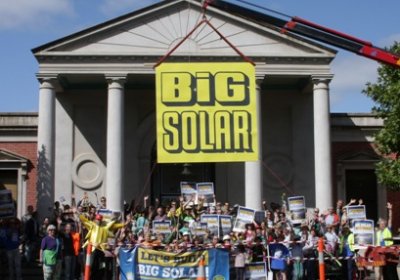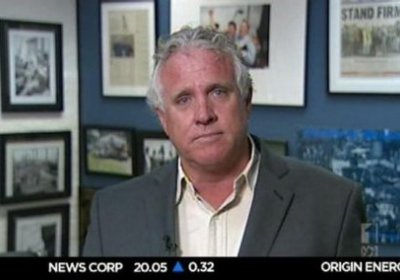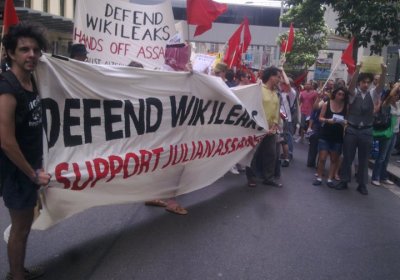Throughout June, the United States was hit by freak storms, intense heatwaves, prolonged drought, huge floods and out-of-control bushfires that have burnt out more than 2.1 million acres.
Simon Butler
The Brumby’s Bakery chain has apologised after its managing director was caught out telling franchisees to jack up prices and “let the carbon tax take the blame”. Brumby’s parent company distanced itself from the scandal, telling the stock exchange it was just an “isolated incident”.
Not long after Melbourne’s recent earthquake a few wags leapt on Twitter to blame Australia’s carbon price for causing it. Greens Senator Richard Di Natale made the same joke in parliament a few days later.
Australia’s parliament voted to set up the Clean Energy Finance Corporation (CEFC) on June 26. The law was backed by Labor and Greens MPs. Mainstream environment groups have welcomed the initiative, saying the CEFC will make $10 billion available to fund clean energy.
With the dire warnings from climate scientists about the need to cut carbon emissions quickly, such a big investment in clean energy sounds like a good thing. But there is a catch: most of the money won’t be spent on clean energy at all.
Next week, Green Left Weekly will launch its newest project: an internet-based current affairs program inspired by shows like Democracy Now and Julian Assange’s The World Tomorrow.
The first Green Left Report will feature interviews with WikiLeaks supporter and activist Cassie Findlay and Cairo-based Australian journalist Austin Mackell.
Left Turn: Political Essays for the New Left
Edited by Antony Loewenstein & Jeff Sparrow
Melbourne University Press, 2012
RRP $32.99
In the past few years, the world economy has fallen into its deepest crisis for eight decades with no end in sight, shocked scientists have reported new evidence the climate is changing quicker than feared and opinion polls have reflected widespread anger and cynicism with mainstream political parties openly tied to business interests.
If Australia were a democracy and governments had no choice but to carry out the will of the majority, we’d be well on our way to a 100% renewable power grid.
Recent polling organised by climate action groups around the country found that 94% of 12,000 people polled said they wanted big solar power stations built in Australia. And 93% of those polled said the government should invest public money to make that happen.
The Maritime Union of Australia (MUA) has accused the federal government of unfairly targeting waterfront workers as part of a so-called crackdown on organised crime.
Home Affairs minister Jason Clare said on May 25 that federal police would be given new powers to put waterfront workers out of a job if they have a criminal record or are suspected of involvement in organised crime.
Gina Rinehart — mining tycoon and Australia’s richest person — is now also the world’s richest woman. Last year, her wealth grew by $18.87 billion to $29.17 billion. Her wealth grew $52 million a day or $1 million every 30 minutes.
It means that for every second that passed in 2011, Rinehart made more ($598) than a minimum wage earner made in a week ($589.30).
Rinehart’s fortune is now so big, if she spent $1 million a year her money would last for 29,170 years. It would take a minimum wage earner about 950,000 years to reach Rinehart’s bank balance
Australian supporters of WikiLeaks announced nationwide protests after news that Britain’s supreme court will decide on Julian Assange’s final appeal against extradition to Sweden on May 30. The protest rallies will take place in most capital cities the next day, May 31.
The rallies will take place regardless of the court’s decision. Even though Assange has spent the past 534 days under house arrest without charge, protest organisers say the campaign to defend Assange and WikiLeaks is only just beginning.
The NSW Teachers Federation (NSWTF) has called on its members to stop work for two hours on May 18. The union says it has made the decision because “the future of public education in NSW is at stake”.
The federation said: “The purpose of the [stop work] meetings will be to hear detailed reports on the very serious impact that Local Schools, Local Decisions and other state government policies will have on working conditions, student learning opportunities and the resourcing of our schools.”
Right now, there is an opportunity to slash Australia’s carbon emissions by 5 million tonnes a year in one stroke. The city of Port Augusta in South Australia has all the right conditions to make it Australia’s first baseload renewable energy hub.
The two coal-fired power stations at Port Augusta are getting old. Industry experts say they may be forced to close as soon as 2015.
- Previous page
- Page 6
- Next page










